
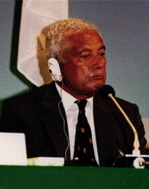
Mr. Chairman Kuranari,
Mr. Ryoichi Sasakawa,
Distinguished Colleagues,
Ladies and Gentleman,
I should like, first of all, to thank you Mr. Chairman, and you, our host and sponsor, Mr. Sasakawa and the Sasakawa Peace Foundation, for this wonderful opportunity to come together with our colleagues from the South Pacific to talk about our development needs, our development priorities and our development aspirations in the Pacific Island region. That we have all readily accepted the invitation from the Sasakawa Peace Foundation to come to this meeting is clearly a tangible demonstration that we all share Mr. Sasakawa's vision and belief that the world is one family and that we are all brothers and sisters.
And there is no better way to give reality to this personal philosophy than to begin here in our own Pacific Region through this special gathering of our community of Pacific Island Nations. By your own presence here, Mr. Chairman, you have also demonstrated in a very real way your country's continuing commitment to the pledge that you had given during your visit to our region, as the Foreign Minister of Japan, in January 1987 - a pledge that in a spirit of neighborly friendship and openness Japan seeks to work with Pacific Island Nations in contributing to their development.
At the same time, our own presence here today from the South Pacific is an affirmation of our recognition of the importance of Japan in the Pacific and in the world at large and our earnest desire to develop the closest degree of friendship and cooperation with your country.
A strong and vibrant relationship of friendship and cooperation between Japan and the Pacific Island Nations can only be to our mutual advantage and also a major contribution to the continuing peace, stability and development of our Pacific Region.
Some years ago when I first came to this beautiful country on an official visit, my host at the time was the then Prime Minister, the late Mr. Ohira. I shall always remember his stirring words of welcome on my arrival. He said, "Although the countries in the Pacific area are spread over vast distances, the Pacific Ocean really unites us all and it is in our common interest and to our mutual advantage, as a Pacific Community of Nations, to explore to the fullest its enormous potential as a binding link between our nations and as an enduring bridge of understanding between our peoples."
Prime Minister Ohira was, of course, one of the first and leading proponents of the concept of a Pacific Community of Nations. Like Prime Minister Ohira and as you yourself, Mr. Chairman, said during your visit to our region, I believe sincerely that the Pacific Ocean is an ocean of boundless opportunity not only as a highway of commerce between our countries but also as a bridge through which to forge closer relationships amongst our peoples.
As I look to the future, I see great promise in our coming together as a distinct community of Pacific Island Nations collectively committed, through friendship and cooperation, to promoting peace, progress and prosperity in our region.
I, therefore, look forward to these two days of discussions and exchange of views both on our mutual needs and problems and on an agreed plan of action through which we can carry forward our cooperation and strengthen further our friendships. In concluding, may I again, through you Mr. Chairman, convey to Mr. Sasakawa and the Sasakawa Peace Foundation our warm congratulations and gratitude for their foresight and initiative in convening this historic meeting.
At the same time, and with your permission Mr. Chairman, I would also like to take this opportunity to address a few special remarks to my distinguished colleagues and friends from the South Pacific.
As this is the first time I have joined you as a group following the political events in Fiji last year, I would like to thank each one of you for the understanding, the sympathy and the support which you have shown for our endeavors in Fiji to return our country to normalcy.
We are making steady progress not only in our country's economic recovery but also in putting together a new constitutional framework through which we shall bring our country back to parliamentary government. In fact, just before we left Fiji to come to this meeting, our cabinet completed its consideration of the draft constitution which is to be put to a committee of representatives of the various ethnic communities in Fiji for their consideration. It will be a while yet before our collective consideration of our new constitution is completed. But we are moving forward and in the right direction.
For us in Fiji, it has been a most moving experience to know that in our hour of greatest need, you, our own Pacific Island neighbors, and close friends like Japan, have been unwavering and unfailing in your support and understanding of Fiji. This is truly the Pacific way and in an interesting sense it is a direct reflection of the very close affinity in the cultural make-up of our respective peoples.
However, be that as it may, we shall always remember with an infinite sense of gratitude your supreme act of faith and confidence in Fiji. Thank you.
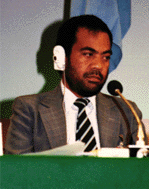
Chairman of the Organizing Committee,
Distinguished Participants,
Ladies and Gentlemen,
I wish to take this opportunity to thank all those people who have given so much of their time and effort to organize this meeting. In particular I wish to mention the Sasakawa Peace Foundation and its Chairman, Mr. Ryoichi Sasakawa, who has generously committed not only his facilities, but his resources to bring us here.
I would also like to express my gratitude to the Government and people of Japan for the hospitality graciously accorded to all of us from the moment we arrived in your country. Our meeting here in Tokyo at this time is important for many reasons. First it is good to get together now and again to share views and ideas with one another. This is often not easy because of our own busy schedules. But I must say that the effort is worth the time. And I hope that when we leave Japan at the end of this meeting it will be with the feeling that we have all gained something out of it.
On the second level it gives us the opportunity to see the impressive achievement of this great nation and its people. Our short time here should give us the opportunity to draw some valuable lessons in our endeavors to develop our respective countries. One such valuable lesson is that despite development in the contemporary sense, a country can still keep intact its social fabric and cultural heritage. This is something to be admired. As we all strive to develop our economies for the betterment of the standard of living of our people, it is essential to maintain and promote our cultural heritage and traditions that our people have established over the years. I know that too often the temptation is to opt for new ideas and methods of doing things. This is not wrong. But there is no need to throw overboard our traditions in the name of development.
Japan has shown us that traditions can be an integral part of development. Over the years since the last world war, Japan has achieved remarkable progress. Initially we know that it had to borrow ideas and techniques from abroad as a means of accelerating its development process. But within that period also it has successfully competed against the more established powers.
I know for small countries such as Kiribati, it is not easy to emulate that success. We have a small population and limited resources to start with. Our markets are also very small and our level of development will not enable us to compete with the developed countries. The gap is too big. But like Japan, given the will to work hard and succeed, I believe we can achieve a level of development that can give us a better life, and support our political independence.
One lesson that we have learnt since independence is that no island can afford to remain an island. But that is also true on the international stage. So much more now that the vast distances that used to separate us no longer exist, with vast technological advances in the areas of communication and transport. It used to take months to travel from one end of the Pacific to another. Today it takes only a few sleepless hours.
The Pacific, and indeed the world, has shrunk into one small community. That community must learn to live in harmony with itself. And this involves respect for the wishes and national aspirations of its members - big or small, rich or poor. Japan, as one of the economic superpowers, has a role to play in this new global community. In the Pacific for instance, we appreciate Japan's assistance in various areas of our development efforts and we are grateful for these. We note also the future intention of the Japanese Government as regards its plan to further assist our part of the world.
While that is certainly very important, I believe that it needs to be supplemented by promoting understanding and good relations which can only be achieved through a process of exchange of views and dialogue. We are pleased therefore for this opportunity to meet like this in Japan. I believe that this meeting contributes to that goal.
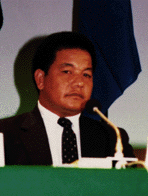
Mr. Chairman, your excellencies, Mr. Sasakawa, distinguished leaders of Pacific Island States, distinguished statesmen and leaders of Japan and of the Sasakawa Peace Foundation. At the outset I would like to extend personal greetings to His Majesty the Emperor, His Imperial Highness the Crown Prince, and to His Excellency, Prime Minister Noboru Takeshita.
I bring warm greetings of the people of the Federated States of Micronesia to the people of this beautiful and culturally rich nation of Japan and in particular to you, Mr. Ryoichi Sasakawa and the Sasakawa Peace Foundation.
I join my colleagues from the Pacific in extending my most sincere gratitude to the Sasakawa Peace Foundation for the kind invitation and generous assistance. I should also like to state how deeply we appreciate the courteous assistance the esteemed government of Japan has so accorded us. The well-planned arrangements and the warm hospitality have made our stay most enjoyable and comfortable and have clearly demonstrated the efficient, courteous, and friendly nature of the people of Japan. Excellencies, ladies and gentlemen, we are gathered here today responding to the noble cause of world peace. Mr. Ryoichi Sasakawa has devoted his entire life to world peace. "The world is one family and all mankind are brothers and sisters" is his philosophy of peace in which all of us here can find so much meaning. Mr. Sasakawa says what he believes and commits his resources to achieving what he believes. At the age of 89, his tireless efforts for the cause of peace have indeed touched the four corners of the earth.
As this occasion marks the first time that leaders of Pacific Island states have met in Japan, the Sasakawa Peace Foundation most certainly should be commended for its foresight and wisdom in convening this important conference to discuss ways to further enhance cooperation and understanding between the Pacific countries and this beautiful country so that together we can advance the cause of world peace. I should like to also say how grateful I am to the Sasakawa Peace Foundation for this rare opportunity to meet some of my fellow Pacific leaders, some for the first time, others to renew past acquaintance.
My country's policy is that regional cooperation is important and should be pursued. Each Pacific Island Nation should and ought to be economically and politically secure within its boundaries. This we believe is an important ingredient for international cooperation and peace. Excellencies, ladies and gentlemen, I humbly suggest that industrialized countries like Japan, the United States and others which are generously extending assistance to us should recognize the need to formulate their cooperation and assistance to be always consistent with the actual requirements for development of our respective countries - requirements that are basic to peace, stability, and cooperation in an era of interdependency in the world. I take pride in pointing out that my own country's relations with Japan date back to the turn of the century. Now that 40 years of imposed external rule under the U.N. trusteeship system has ended, the Federated States of Micronesia is free to build upon the ethnic and cultural ties and goodwill between the people of Japan and the people of the Federated States of Micronesia.
At this junction, I would like to acknowledge with heartfelt gratitude that the Federated States of Micronesia has been the recipient of much-needed assistance from the government of Japan. My government recently concluded an agreement with the government of Japan on the extension of the Japan Overseas Cooperation Volunteers Program to the Federated States of Micronesia which opens a new chapter in our ever-evolving and ever-strengthening relations with Japan. I look forward with optimism to increased cooperation and expanded relations with Japan in the days ahead.
Once again, I am grateful to the host of this conference for providing us this opportunity as leaders of our respective Pacific Island Nations to meet together and along with Japan to discuss issues relative to increasing cooperation, with a greater awareness in Japan of the needs of our island nations. I am optimistic and have every confidence in the outcome of this conference.
Again, I thank the Sasakawa Peace Foundation for extending me the invitation to visit this beautiful country. Domo Arigato Gozaimashita.
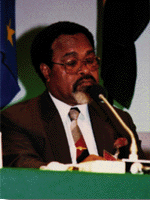
Mr. Ryoichi Sasakawa,
Honorary Chairman of the Sasakawa Peace Foundation,
Chairman,
Your Excellency Mr. T. Kuranari,
Honorable leaders of the Pacific Island Countries,
Distinguished guests,
Ladies and gentlemen,
I am honored and delighted to be here in Tokyo, to attend and participate with all the distinguished representatives at this first conference of Pacific Island Nations being held in Tokyo, Japan.
Here in Tokyo, one can feel and see a great sense of participation and activity by a whole nation in an industrial society. One can feel the heartbeat of the western industrial-economic system at work here.
At the same time, there is a very strong sense of dignity, and respect for the individual that makes Tokyo and Japan so unique in the modern economic system. The roots of the past and the values of the present and future sing in very close harmony. As a possible model for development, Japan can provide some useful alternative lessons for developing countries in the same way that Europe and the United States have tried to do. I would venture to say that Japan presents a much more familiar and relevant environment for Pacific Island Countries than other models. In this era of increasing pace and pressure of industrialization, Pacific Island Nations are, by their very nature, becoming more vulnerable to the influence of the western industrial world. Most of the Pacific Island Countries achieved political independence or autonomy in the last twenty years. The "parties" have ceased and Island countries are waking up to see that the challenges of development have not become easier. In fact, the circumstances have dramatically changed and are bringing up a new sense of urgency and desperation not felt before. This is because the very basic fabric of each Nation is being threatened, not by a visible foreign administration in control, but because the majority of the people have missed out or are being excluded from constructive participation in the new society. At the same time, the forces of change cannot be seen, influenced, controlled or reversed without some major overhauling of the very basic foundations of each Island system of government.
I believe recent events in the Pacific are warning signals that all of us here need to carefully consider.
Australia and New Zealand have been active and generous supporters of Pacific Island Nations. The Island nations now look to Japan to assist.
The conference, therefore, in my view, is very timely and is taking place in an appropriate location.
As a relatively small Pacific Island Nation, Japan has demonstrated, once again, that smallness does not necessarily mean helplessness nor should it be an obstacle to achieving one's goal. Over the next few days, I look forward to contributing in whatever way I can to assist in strengthening our hopes and efforts in promoting the cause of our Island people and the seeds of friendship with Japan and its people.
I am conscious that Japan is a major economic power. It has the capacity to influence the livelihood of many ordinary people in many parts of the world including Pacific Islanders. This year, Japan will become the largest contributor of development assistance to developing countries. What implications this has for Pacific Island Nations is unclear. I would hope however that Japan is able to tailor its program of assistance to meet the needs and particular circumstances of the Island Nations. There is therefore an urgent need to improve the level of consultations between Japan and the Island Nations.
It is natural that small Island countries are insignificant in the minds of those in the decision-making levels of government and private sector in industrial countries. One could therefore understand if Japan's leaders had over-flown the Island countries to go to the United States or Australia and New Zealand. I am pleased to say however that Japan's leaders have not taken this road. I was personally honored to welcome the then Prime Minister of Japan to Papua New Guinea, His Excellency Mr. Yasuhiro Nakasone. Last year, then Foreign Minister, His Excellency Mr. Kuranari also made visits to Fiji, Vanuatu and Papua New Guinea. I am very pleased that Mr. Kuranari is maintaining his strong personal interest by honoring us with his presence at this conference and in accepting the Chairmanship. I also want to pay a particular tribute to Mr. Sasakawa and the Foundation for their vision and initiative in sponsoring this conference. Once again, Mr. Sasakawa has taken the lead in a field where others are either reluctant or do not wish to tread. The theme and spirit of the Sasakawa Peace Foundation make it the most logical and appropriate organization to promote the interests of the Pacific Island Countries.
The Pacific wants peace. And we want progress and prosperity for our children, grandchildren and great-grandchildren. The Foundation's active interest and involvement in the Pacific is a welcome move. It is also a refreshing wind. I say this because Japan's relationship with the Pacific Island Nations can be improved. Many of our people still see Japan from the War experience. In more recent times, it is through fisheries and forestry industries. The picture is not a positive one .... it is a fact we must face!
I am therefore encouraged with the interest of Japan's leaders and private individuals like Mr. Sasakawa. I believe we are making a right step forward in building understanding, true partnership and cooperation.
The Takeshita Administration's basic new direction and new five-year economic plan for Japan, entitled "Japan Living Together with the World" is an excellent theme to build on. We now have the opportunity to consider whether a similar type of plan should immediately be commissioned by this conference and the Sasakawa Peace Foundation.
As I said earlier, Pacific Island Countries are at a turning point. They can either go backwards and follow the experience of many unfortunate countries in other parts of the world, or they can be a part of the Pacific Era! This conference can point and encourage a direction towards peace and prosperity. This requires Japan and Island Nations Working Together! Without wishing to preempt the wishes of the conference, I would like to say that should the conference decide to hold a similar meeting, Papua New Guinea would be prepared and honored to act as host.
Once again, I am honored to be present at this conference. I am personally delighted because there are many friends here. I can also make new friends. Thank you.
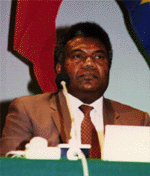
ェ@ Chairman of the Sasakawa Peace Foundation,
Distinguished Government and Business Leaders of Japan,
My Distinguished Colleagues from the South Pacific States,
Members of the Diplomatic Corps.,
Distinguished guests,
Ladies and gentlemen,
I find it a real privilege and honor to be here at this important conference which has been thoughtfully convened and generously supported by the Sasakawa Peace Foundation - a Foundation I understand is renowned for its good deeds in many parts of the world. As a leader of a small developing country, I am very grateful to the Foundation for making it possible for me to visit Japan for the first time, and more importantly to have a close encounter with this great Foundation.
Indeed, I consider it a worthwhile and appropriate gesture on the part of the Foundation to have invited us - the leaders of the small states in the South Pacific - to this conference, and indeed to Japan as a whole.
My country has significant historical and economic links with Japan. Solomon Islands has become a part of the history of Japan as much as Japan has become a part of our history. Today, Japan is becoming a major contributor to our economic development. Several large Japanese companies are expanding their investments in Solomon Islands. These include the Taiyo Fisheries Co. and the Kitano Construction Corporation. Moreover, an increasing number of Japanese tourists are visiting memorable places in our country, such as Guadalcanal and New Georgia. It is these kinds of economic and human cooperation that we look forward to strengthening with Japan from now on. In fact, I believe that Japan with its economic might can play a more constructive and mutually beneficial role in the modernization process of the small island states, and I am pleased to say from experience that we can indeed count on Japan to enhance economic cooperation between nations through peace, mutual understanding and respect. Solomon Islands, like Japan, is a peace-loving nation and it is our desire to stay that way. We like to understand other people and be understood by them on a person-to-person level, since only through this kind of mutual interaction, I believe, can many of the misunderstandings between countries be minimized and new constructive relations built. Although Solomon Islands is a small sovereign state in an ocean whose peaceful environment is being threatened by the existence of certain dubious bilateral and multilateral economic deals as well as the overt presence of super-power rivalry - Solomon Islands is prepared to continue working together with those countries within and outside the South Pacific to uphold the serenity and peacefulness of our region. Japan is one of the countries we can look up to for leadership in this regard.
I note that the subjects which this conference will address are important to the promotion of the relationship between Japan and the countries of the South Pacific. I very much look forward to actively participating in the conference, as well as to strengthening my country's association with the Sasakawa Peace Foundation.
Finally, I wish to take this opportunity to sincerely thank the Sasakawa Peace Foundation for organizing this conference and for allowing my country to participate. I do hope that the Foundation will in the not-too-distant future assume a strong presence in the South Pacific by having its own office in that region, and through the establishment of the Pacific Island Nations Foundation make that presence felt in the countries of the region. My country fully supports the establishment of such a Foundation. Thank you.
Mr. Chairman,
Distinguished Delegates,
Ladies and Gentlemen,
I should like to thank you on behalf of His Majesty's government for inviting me to attend this important conference and for the warm hospitality which you have extended to me and my delegation.
It is fitting that the first private foundation which has managed to bring together most of the leaders of the South Pacific should be one dedicated to peace and understanding between nations. But for those of us who have known Mr. Ryoichi Sasakawa, it does not come as a surprise because of his personal commitment and his substantial contribution to the belief that all men are brothers. While we all share this lofty belief, the establishment of the Sasakawa Peace Foundation should serve as a good starting point from which we, living in a troubled era as the 20th century draws to a close, might look with inspiration and renewed hope to a peaceful beginning of the 21st century. I am sure that Mr. Sasakawa has every intention of being with us on that happy occasion.
Few can doubt the emerging importance of the Pacific Rim as a dynamic economic system or Japan's leading contribution to bringing about this reality. It is important, for those who might wish to follow Japan's economic success, to understand that she has not only succeeded in the reconstruction of her economy to the extent that she is now regarded as the world's richest nation, but did so without altering those qualities, acquired through many centuries, which set her apart from other nations. It is ironic that the same Pacific Ocean which isolated Japan for 300 years, brings us closer together in harmony today. Thank you.
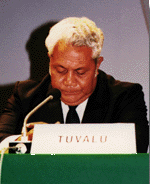
Mr. Sasakawa,
Mr. Chairman,
Distinguished Colleagues,
Ladies and Gentlemen,
First of all may I take this opportunity to thank Mr. Ryoichi Sasakawa and his Peace Foundation for the warm reception extended to me and the members of my delegation since our arrival and for making it possible for us to be present at this important conference.
I should also like to express appreciation to the Sasakawa Peace Foundation for the effort which has gone into organizing this conference and the convening of it.
The conference provides an opportunity not only for us to be able to exchange views on social and economic matters of concern to our respective countries but also to renew friendships and to make new acquaintances.
It is also a pleasure to be able to meet in Japan, a place I have been looking forward to visiting, and an important nation which has contributed greatly to focusing world attention on the Pacific Region.
We value highly the links which have developed between Japan and countries of the South Pacific Region, including Tuvalu, over the last decade. As Pacific States we share a common interest in seeing peaceful development in our region.
We in the South Pacific appreciate our good fortune in living in an area free of great power confrontation - let alone the possibilities of nuclear confrontation. This environment has been maintained - thankfully - by a low level of conventional forces. The South Pacific Nuclear Free Zone Treaty which entered into force on 11 December, 1986 is aimed at ensuring that the existing balance is not upset through the introduction of nuclear weapons. Tuvalu was one of the first states to ratify this treaty and has always hoped that Pacific rim countries in particular would respect its objectives.
Despite the existence of such a convention and the strong desire for peace by the small countries of the South Pacific, I firmly believe that peace and security can only be maintained in our part of the world if all the countries in the region have economic security. Countries like Tuvalu have such limited resources that we have found it necessary to rely on the assistance of others to ensure our economic survival.
Both bilateral and regional assistance programs provided by Japan have been invaluable and have helped our country build up confidence for the future. Assistance in training, fisheries and telecommunications sectors are important examples of ongoing Japanese aid to Tuvalu.
We are confident that these bilateral and regional ties will continue and be broadened to include other development assistance that will ensure the continuation of a peaceful and stable region. In fact it is in the interest of us all - both the South Pacific and Japan - that these developments continue to be strengthened.
Tuvalu welcomes Japan's interest in a strong partnership with the South Pacific Region and any effort by Japan to increase its development role in the Pacific. As small states we cannot necessarily expect to match the high levels of development that Japan has been able to achieve in recent decades. However, as a friend and neighbor we are encouraged by the willingness of the Japanese government together with our other major donors to support our long term development objectives. South Pacific people are seeking higher standards of living and in my view this can only be achieved by maximizing the use of our own limited resources through the support of countries like Japan. Our recently agreed Fishing Communities Development Project is an example of where Japanese technology and financial support is being used to encourage the greater commercialization of our fishing resources.
It is understood that Japan has some difficulties in accepting a concept of a regional fishing agreement based on the model of the current fishing agreement between the United States of America and most Pacific Island Countries. It is my hope and belief that Japan will soon find ways to overcome its difficulties. Fisheries are one of the few resources of Pacific Island States and Japan's cooperation through such an arrangement would be much appreciated. In seeking such an arrangement, we are not in any way implying that our present bilateral arrangements have been unfair; however, it is in line with the strong support Pacific Regional Countries give to the concept of regionality, and the belief that this is the only way many of us can be heard at all in the international arena.
Regional approaches to issues of concern to the Pacific Island States have been found to be our strongest mechanism for receiving world recognition. This is particularly important for a country the size of my own where we often feel like a voice in the wilderness if expressing our opposition to certain international events. The Nuclear Free Zone Treaty, the Multilateral Fishing Agreement with the United States, and the Forum's stand on New Caledonia are good examples of where we have been able to gain recognition through regional solidarity.
As I have already indicated, our marine resources, and in particular fisheries, are our major economic resources. We wish to develop these for the good of all Tuvaluans now and in the future; and in order to ensure their availability, in terms of both quantity and quality, we object very strongly to the dangers brought to the region through any form of dumping of nuclear and other toxic wastes. We are not only insisting on maintaining the good health of this generation of Tuvaluans but on ensuring the lives of those who will follow.
At this year's UN General Assembly Forum on the island states, we will be proposing a resolution aimed at bringing about a long-term settlement satisfactory to all resident ethnic groups in New Caledonia. The support of Japan as an influential player in the international arena is much needed and will greatly assist the objective of the resolution in encouraging the French Government to continue to proceed with an internationally acceptable process in the decolonization of New Caledonia. May God bless us all and guide us in our deliberations.
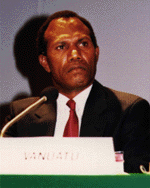
Mr. Chairman,
Distinguished Delegates,
Ladies and Gentlemen,
It is indeed an honor and privilege to be with you today representing the government and people of Vanuatu in this important conference. I bring you warm greetings from the President and the Prime Minister of Vanuatu and my people's best wishes to the Sasakawa Peace Foundation and the People of Japan. May I also express my gratitude to the organizers of this conference for the excellent facilities and assistance extended to my delegation since our arrival in Japan.
Mr. Chairman, As I look around this hall, I behold people representing different races, places and backgrounds. We speak different languages and our ways of thinking are varied but I believe we have one thing in common: that our hearts are one for humankind. My definition of humankind includes the dying and the destitute, the poor and hungry, it includes those who are struggling for freedom. I say this because I believe that fellow humans experiencing these evils manifest the absence of peace and lack of understanding. The Sasakawa Peace Foundation however is founded in the spirit of PEACE, INTERNATIONAL UNDERSTANDING, EXCHANGE and COOPERATION. Let me add that these goals can only be harvested if we, those who are well, warm and wealthy, lend positive support to those requiring our help.
Amongst PEACE, INTERNATIONAL UNDERSTANDING, EXCHANGE and COOPERATION, I think INTERNATIONAL UNDERSTANDING must come first, because we cannot find peace if we do not understand why there is absence of peace what causes such absence, and what remedies are available. Before we exchange, whether goods or ideas, we must have an understanding between one another that what we are engaging in is beneficial to everyone. Before we talk about cooperation between one another, we must understand each other as beneficiaries of such cooperation and why we are cooperating with one another. Hence understanding one another, whether regionally or internationally, is the prerequisite to global peace, exchange and cooperation.
Mr. Chairman, In Vanuatu, we have tried to understand our neighbors both regionally and internationally by adopting a NON-ALIGNMENT policy which we think will enable us to get a better and deeper understanding of the world and its citizens as ONE SINGLE GLOBE and not divided up into "Western" and "Eastern", "North" and "South", "Third World" and presumably "First and Second Worlds"! We have been criticized several times for adopting the non-alignment policy but we feel it is a "philanthropic" approach. Today we have ties with many nations, organizations and associations - both at regional and international levels.
Since we are in Japan, I would like to use our relationship with Japan as a case. We formally established diplomatic links with Japan after our 1980 Independence. To date our relationship has been one of mutual benefit: we have received technical and financial assistance from Japan and they in turn use our international finance center as their investment base and our paradise as their holiday destination.
In early April 1987, our relationship entered into a new dimension when the Japan-Vanuatu Friendship Association was born to further develop and promote relationships at all levels between Vanuatu and Japan in official matters, business, cultural exchanges, trade and tourism. In Japan the Chairman is Mr. Bunnosuke Yoshioka, the previous President of the Forum Club. He, on his part, has been very instrumental in setting this association up and promoting it in Japan. As a result, this association is now growing rapidly in Japan. The Japan-Vanuatu Friendship Association is also now seeking membership to the Sasakawa Peace Foundation.
In Vanuatu, President Ati George Sokomanu is Patron while Mr. Sampson Ngwele was appointed first Chairman. This association will play an important role in fostering and cementing ties between the two countries and, we hope, it will achieve our aim of understanding Japan better through cultural tours and other levels of exchanges. By the same token we invite our Japanese friends to visit us and participate in our development by investing in our international finance center. Already we are seeing Japanese investment into Vanuatu, but there is plenty of room for more investment.
Mr. Chairman, Finally, it has been a privilege to address this forum, and I thank you for your attention.
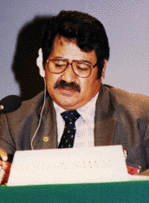
ェ@ Mr. Chairman,
Distinguished Heads of Government,
Distinguished Delegates,
Ladies and Gentlemen,
I am grateful for the opportunity to attend and address this distinguished gathering of leaders and ministerial colleagues of the South Pacific Region.
In particular, I thank the Sasakawa Peace Foundation for the invitation extended to the government of Western Samoa to be represented at this unique gathering of Pacific Countries leaders here in Japan. I also commend the Foundation for its foresight and initiative in bringing together an impressive gathering of Pacific leaders and representatives for a fruitful exchange and discussion of issues confronting our region which will have a direct bearing on our continued development.
Mr. Chairman, this conference and more significantly its venue provide a rare opportunity for our Japanese colleagues and friends to get a first-hand account of what the Pacific Region is, what it represents, and the kind of problems the island states are facing in their nation-building efforts. On a visit to the South Pacific in 1987, the then Japanese Foreign Minister Kuranari stated that "Japan cannot be indifferent to the problems facing the Pacific Island Countries."
I could not agree more with that statement. The Pacific Region, as you all know, is becoming the focus of superpower rivalry and with the declaration of this decade as the "Decade of the Pacific" it is certainly opportune that we ought to gather here to debate its future development in an atmosphere of peace and tranquillity that befits its very name and way of life that we have come to know and cherish as the Pacific way.
In a coherent effort to achieve that objective the South Pacific Countries have worked together through various regional organizations in support of measures to guarantee the political and economic security of the region.
One of the important measures adopted by the Pacific Forum countries was the South Pacific Nuclear Free Zone Treaty adopted at the South Pacific Forum Meeting in Rarotonga in August 1985, which incidentally coincided with the 40th anniversary of the bombing of Hiroshima. The Treaty came into force in December 1986. It prohibits the production, testing, and use of nuclear weapons in the region. It was at Rarotonga that the Forum leaders also recognized the importance of establishing dialogue with Japan, being a leading Pacific partner in development. I note with interest that the Japanese government has responded positively to our call, but much is left to be done in the development of our small economies.
I applaud the role played by private organizations such as the Sasakawa Peace Foundation in the promotion of peace and international understanding through its positive support of worthwhile projects such as the conference of Pacific leaders and representatives. It is indeed an indication that NGOs and the Japanese public in general have also taken a keen interest in the development of the Pacific Island States.
Although Japan is a member of the Pacific Community sharing geographical and historical links with the Pacific Island Countries, I hasten to say that much is left to be done to bridge the gap of cultural and social misunderstandings that seem to emerge from time to time between Japan and the Pacific Island States. I hope that the dialogue that has been established between our Forum members and Japan will be enhanced in the future and that the proposed establishment of a Japan-Pacific Foundation at the conclusion of this meeting will contribute to the further strengthening of our social and cultural ties and understanding. The government of Western Samoa welcomes the establishment of a Japan-Pacific Foundation, and the Sasakawa Peace Foundation is to be applauded for this valuable contribution. In conclusion, I would like to express my sincere thanks to the Sasakawa Peace Foundation and all those associated with this conference for the warm hospitality extended to our delegation during our stay here. Domo Arigato Gozaimasu.
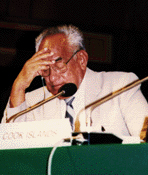
Mr. Chairman,
Your Excellency Beretitenti Ieremia Tabai,
Honorable Prime Ministers,
Distinguished Representatives of the Sasakawa Peace Foundation,
Distinguished Participants & Associates of this Conference,
Ladies and Gentlemen,
Allow me first of all, Mr. Chairman, to congratulate you on your election as Chairman. I am certain that under your leadership, we will be able to reach the goals of this conference.
I would also like to offer my congratulations to the Sasakawa Peace Foundation for its initiative in bringing us from the Pacific Islands together here in Tokyo under the umbrella of this first Pacific Island Nations Conference in Japan. I believe that this is the biggest gathering of Pacific Island Government Leaders and Ministers in Japan. The fact that this has been achieved through the efforts of a private foundation is significant in itself. In the 1960's and 70's, a gathering such as this would not have been possible, especially at the behest of a private foundation. In those years, budding Pacific Island Governments would not have had the international experience to recognize the key role that private foundations have in the regional community, let alone in the international community. That so many of us from the Pacific Island Countries are here today signifies, amongst other things, that we now recognize the important role that private institutions like the Sasakawa Peace Foundation have in the development of our region.
Looking around at all of us gathered in this hall this morning, Mr. Chairman, reminds me of a Japanese proverb which goes something like this:
"Rui wo Motte Atsumaru."
I am told that this proverb literally means: "The same kinds gather together." An equivalent English proverb says: "Birds of a feather flock together."
For me personally, while there can be no doubt about the attractions that the SPF program funds might have for the development aspirations of my country and people, my main reason for accepting the invitation to be here is related to the ease with which I and my government and people in the Cook Islands can identify with the foundation on which the Sasakawa Peace Foundation was established: the pursuance of international peace through efforts to attain "international understanding, exchange, and cooperation." For my people and me, the pursuance of peace is an irresistible force since it is at the very essence of our being. I believe that the pursuance of such a worthy objective is at the heart of our presence together at this gathering, "Rui wo motte atsumaru." - "The same kinds gather together."
My presence here signifies the wish of my people and government in the Cook Islands to be recognized as wanting to play our part, however small it might be, to bring peace to every corner of our globe. I also want to pay tribute to the Sasakawa Foundation and its founder, Mr. Ryoichi Sasakawa, for recognizing the need to learn about the plight of our Pacific Island Nations in order to identify appropriate activities for the Foundation in our islands. The realization of this Pacific Island Nations Conference is truly remarkable given the fact that the SPF was established less than two years ago.
Mr. Chairman, I look forward to our discussions over the next few days.